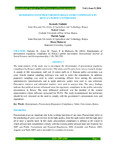Determinants of procurement regulatory compliance by Kenya’s public universities
| dc.contributor.author | Ombuki, Kennedy | |
| dc.contributor.author | Arasa, Robert | |
| dc.contributor.author | Ngugi, Patrick | |
| dc.contributor.author | Muhwezi, Moses | |
| dc.date.accessioned | 2019-09-25T06:28:45Z | |
| dc.date.available | 2019-09-25T06:28:45Z | |
| dc.date.issued | 2014 | |
| dc.identifier.issn | 2307-6305 | |
| dc.identifier.uri | http://ir.mksu.ac.ke/handle/123456780/4870 | |
| dc.description.abstract | The main purpose of the study was to investigate the determinants of procurement regulatory compliance by Kenya’s public universities.The study used Ex-post facto survey research design.A sample of168procurement staff and 42 senior staffs in 21 Kenyan public universities was used. Simple random sampling technique was used to select the respondents. In addition,purposive sampling was used to select accounting officers from among the university administrators.Questionnaires and in depth interview guides were used in data collection.Descriptive statistics and inferential statistics were used to analyze data. The study findings indicate that political factors influenced most the regulatory compliance in the public university procurement in Kenya.The most influential politician was the member of the women representative whose influence accounted for 95.5%. The study recommended that politicians should be well educated on the need to comply with the government’s procurement rules and regulations | en_US |
| dc.language.iso | en_US | en_US |
| dc.subject | Determinants | en_US |
| dc.subject | Procurement Regulatory Compliance | en_US |
| dc.subject | Public Universities | en_US |
| dc.subject | Kenya | en_US |
| dc.title | Determinants of procurement regulatory compliance by Kenya’s public universities | en_US |
| dc.type | Article | en_US |
Files in this item
This item appears in the following Collection(s)
-
School of Business & Economics [175]
Sholarly Articles by Faculty & Students in School of Business & Economics

